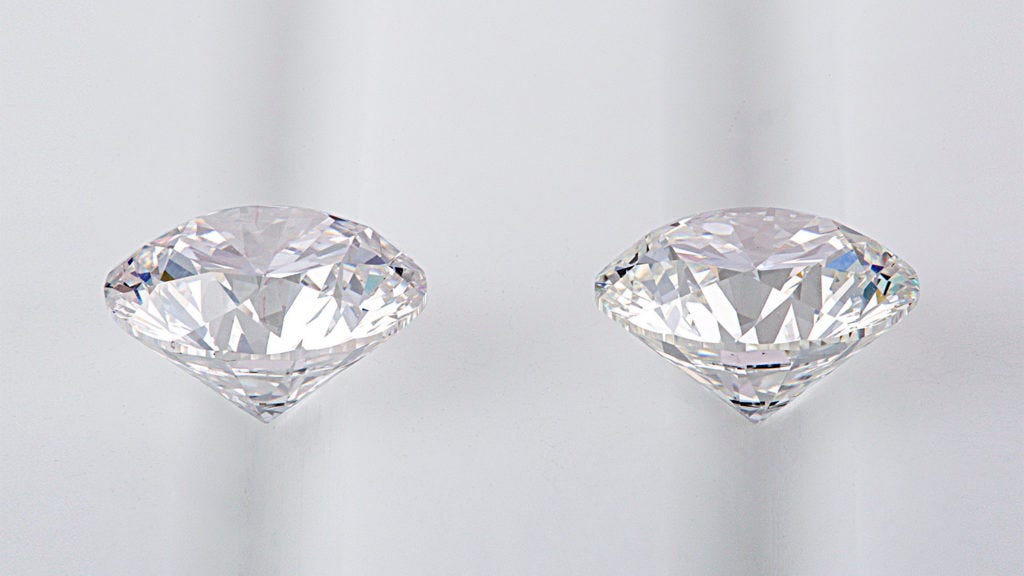
Lab Made Diamonds vs. Real Diamonds: A Comprehensive Comparison
In the realm of precious gemstones, diamonds hold an unparalleled allure. However, the advent of lab-made diamonds has introduced a compelling alternative to natural diamonds. This detailed analysis will delve into the intricacies of both lab-made and real diamonds, providing clarity on their differences, benefits, and implications for the discerning buyer.
Understanding Lab-Made Diamonds
What Are Lab-Made Diamonds?
Lab-made diamonds, also known as synthetic diamonds, are created in a controlled laboratory environment using advanced technological processes. These diamonds possess the same physical, chemical, and optical properties as natural diamonds, making them virtually indistinguishable to the naked eye.
How Are Lab-Made Diamonds Created?
Two primary methods are employed to produce lab made diamonds vs real:
High-Pressure High-Temperature (HPHT): This method simulates the natural diamond formation process by subjecting carbon to high pressures and temperatures.
Chemical Vapor Deposition (CVD): This technique involves breaking down carbon-rich gases, such as methane, to deposit carbon atoms onto a substrate, gradually forming a diamond crystal.
Real Diamonds: Nature’s Masterpiece
Formation of Real Diamonds
Real diamonds, also referred to as natural diamonds, are formed deep within the Earth’s mantle under extreme pressure and temperature conditions over billions of years. These diamonds are brought to the surface through volcanic eruptions, where they are mined and processed.
Characteristics of Natural Diamonds
Natural diamonds are renowned for their unique characteristics, including:
- Rarity: The geological processes that create natural diamonds are rare and complex, contributing to their scarcity.
- Formation History: Each natural diamond carries a history that spans billions of years, adding to its mystique and value.
Comparative Analysis: Lab-Made vs. Real Diamonds
Visual and Physical Properties
Both lab-made and real diamonds exhibit identical visual and physical properties, such as:
- Hardness: Both types rank 10 on the Mohs scale of hardness, making them extremely durable.
- Brilliance and Fire: Lab-made and natural diamonds exhibit similar brilliance and fire due to their identical refractive indices and dispersion rates.
Price and Value
One of the most significant differences between lab-made and real diamonds is their cost:
- Lab-Made Diamonds: Generally, lab-made diamonds are more affordable, often costing 30-40% less than natural diamonds of similar size and quality.
- Real Diamonds: Natural diamonds tend to be more expensive due to their rarity and the extensive mining process required to extract them.
Ethical and Environmental Considerations
Lab-made diamonds present distinct advantages in terms of ethics and sustainability:
- Conflict-Free: Lab-made diamonds are free from the ethical concerns associated with conflict diamonds, ensuring a responsible choice.
- Environmental Impact: The production of lab-made diamonds has a smaller environmental footprint compared to traditional diamond mining, which often involves significant ecological disruption.
Market Perception and Resale Value
Consumer Perception
The perception of lab made Vs real diamonds varies among consumers:
Lab-Made Diamonds: Viewed as a modern, ethical, and cost-effective alternative, particularly appealing to environmentally conscious buyers.
Real Diamonds: Often perceived as the ultimate symbol of luxury and prestige, with a timeless allure.
Resale Value
Natural diamonds typically hold better resale value due to their rarity and longstanding market demand. Conversely, lab-made diamonds may not retain their value as effectively, given the rapid advancements in technology and increasing production capabilities.
Technological Innovations and Future Trends
The diamond industry continues to evolve with technological advancements:
Enhanced Quality: Continuous improvements in lab made diamond production techniques are leading to higher quality stones.
Increased Acceptance: As awareness grows, man made diamonds are gaining broader acceptance and recognition within the jewelry industry.
Choosing Between Lab-Made and Real Diamonds
Factors to Consider
When deciding between lab-made and real diamonds, consider the following factors:
Budget: Lab-made diamonds offer a cost-effective alternative without compromising on quality.
Ethics: Lab-made diamonds ensure a conflict-free and environmentally sustainable choice.
Resale Value: Natural diamonds typically provide better long-term investment potential.
Personal Preference: Ultimately, the choice may come down to personal values and the significance placed on the natural origins of the stone.
Conclusion: Making an Informed Decision
Both lab-made and real diamonds present unique advantages and considerations. By understanding the distinctions and implications of each, buyers can make an informed decision that aligns with their values, preferences, and financial goals. Whether opting for the timeless allure of a natural diamond or the modern, ethical appeal of a lab-made diamond, the true beauty lies in selecting a gemstone that resonates with the wearer’s personal story and aspirations.


